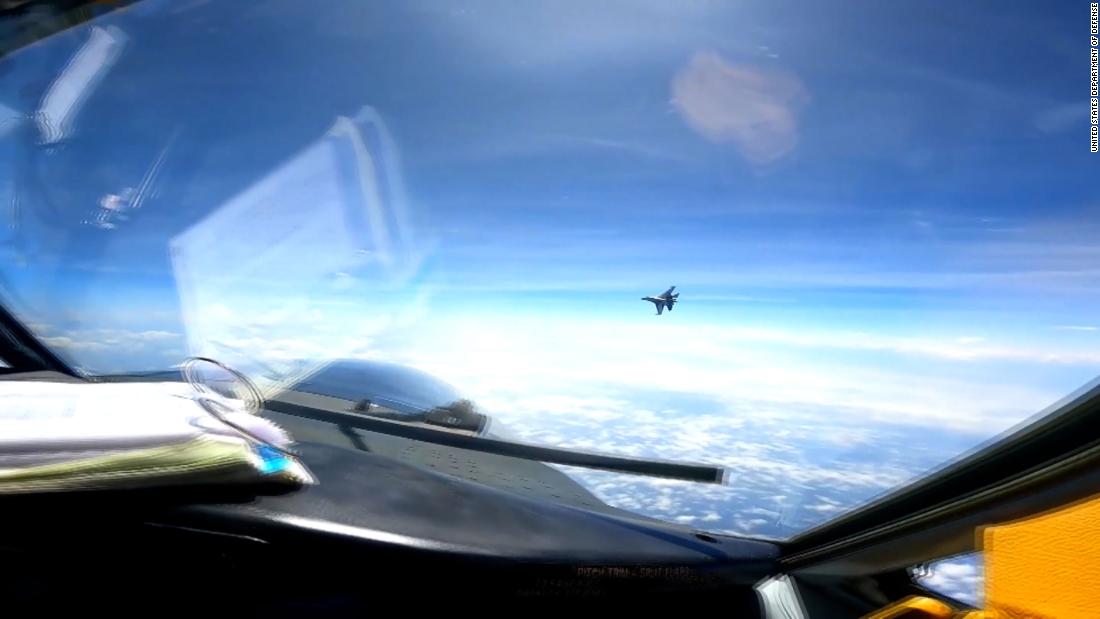- by foxnews
- 08 Apr 2025
US says Chinese jet conducted 'unnecessarily aggressive maneuver' intercepting US spy plane over South China Sea

A Chinese fighter jet conducted an "unnecessarily aggressive maneuver" during an intercept of a US spy plane in international airspace over the South China Sea last week, the US military said in a statement Tuesday.
The Chinese J-16 fighter cut directly in front of the nose of the US RC-135 Rivet Joint reconnaissance aircraft on May 26, forcing the US plane to fly through the wake turbulence of the intercepting aircraft. In video of the incident released by the US military, the turbulence is evident as it disturbs the US aircraft along its flight path.
The RC-135 was conducting "safe and routine operations" in international airspace, US Indo-Pacific Command said.
"The United States will continue to fly, sail, and operate - safely and responsibly - wherever international law allows, and the U.S. Indo-Pacific Joint Force will continue to fly in international airspace with due regard for the safety of all vessels and aircraft under international law," said the statement from INDOPACOM.
The intercept comes amid strained relations between the two countries following former House Speaker Nancy Pelosi's trip to the self-governing island of Taiwan last August and the US' decision to shoot down a Chinese spy balloon that transited over sensitive US military sites in February.
CNN has reported that the US is looking to arrange high-profile visits to China by senior officials to reengage with Beijing on substantive issues but on Monday the Pentagon said China had rejected a proposal for Defense Secretary Lloyd Austin to meet with his Chinese counterpart Li Shangfu at the Shangri-La Dialogue Security Forum in Singapore this week.
A defense official told CNN Monday that China declining the US' offer to meet is "far from the first time that the PRC has rejected invitations to to communicate" from Defense Department officials.
"Frankly, it's just the latest in a litany of excuses. Since 2021, the PRC has declined or failed to respond to over a dozen requests from the Department of Defense for key leader engagements, multiple requests for standing dialogues, and nearly ten working-level engagements," the official said.
In response, the Chinese Embassy in the US questioned the sincerity and significance of the invitation, pointing to US sanctions imposed on Chinese officials, institutions and companies.
Still, another senior defense official said Tuesday that China's interception of a US spy plane in international airspace was being addressed "through appropriate, established diplomatic and military channels."
The intercept is similar to another encounter between US and Chinese military aircraft in late December. A Chinese Navy J-11 fighter jet intercepted another RC-135 Rivet Joint over the South China Sea in what the US called an "unsafe maneuver." The Chinese fighter came within 20 feet of the nose of the US spy plane, forcing the larger, heavier US aircraft to take evasive maneuvers, US Indo-Pacific Command said at the time.
Video of the incident from INDOPACOM showed the J-11 flying off the nose of the RC-135. The J-11 appeared to be shifting closer to the US jet before the two aircraft moved apart.
The US has seen an alarming increase in the number of risky aerial intercepts conducted by Chinese aircraft, according to an INDOPACOM spokesperson. Chinese aircraft have been more aggressive, drawing closer to US and allied aircraft, prompting concern about a potential unsafe incident or miscalculation.
Over the past several years, the South China Sea has emerged as a major potential flashpoint in the Asia Pacific. Not only does the strategic waterway hold vast resources of fish, oil and gas, but about a third of global shipping passes through it - worth about $3.4 trillion in 2016, according to the Center for Strategic and International Studies' China Power Project.
China claims historic jurisdiction over almost the entirety of the vast sea, and since 2014 has built up tiny reefs and sandbars into artificial islands heavily fortified with missiles, runways and weapons systems - sparking outcry from the other claimants.
This story has been updated with additional information.
CNN's Natasha Bertrand, Jennifer Hansler and Ivan Watson contributed reporting.
- by foxnews
- descember 09, 2016
Ancient settlement reveals remains of 1,800-year-old dog, baffling experts: 'Preserved quite well'
Archaeologists have recently unearthed the remarkably well-preserved remains of a dog from ancient Rome, shedding light on the widespread practice of ritual sacrifice in antiquity.
read more


